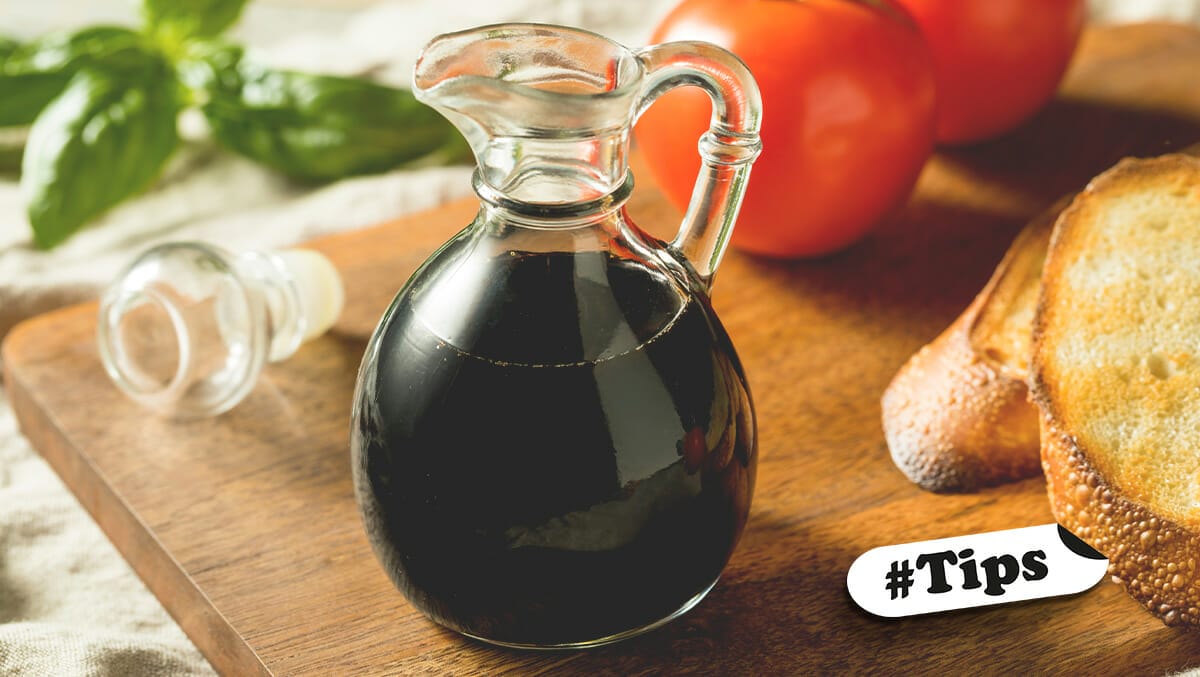Free shipping for orders over € 70

Balsamic vinegar is one of the most loved products by Italians abroad and most sought after by Italian lovers. It is not just a simple vinegar; its colour and consistency give an extra touch to every dish, and it is particularly popular for seasoning dishes.
According to definition, balsamic vinegar ‘is a type of typical Italian vinegar that is produced from filtered grape must, cooked and subjected to alcoholic and acetic fermentation at the same time. It is dark brown in colour and very aromatic’. It is called ‘balsamic’ because in the past it was believed to have curative virtues. It was used as a medicine when suffering from sore throats, stomach problems and respiratory disorders.
Among the current most famous and popular brands in Italy in the large-scale retail trade are: Monari, Ponti, Alce Nero.
Its origins date back to the Babylonians who made it by fermenting dates, figs and apricots and used it as a condiment or to preserve other foods. Over the centuries it became famous throughout the Near East, Mesopotamia, Palestine and Egypt. The first expert vine growers were the Greeks and they introduced vine cultivation throughout the territories of Magna Graecia. The Romans did the same, using vinegar for food preservation, as a condiment and even as a medicine. Over time, man has intervened on the original product, modifying its characteristics and making it more palatable. Famous are, in fact, Modena-style vinegars obtained thanks to the Este family who moved from Ferrara to Modena in 1598. It was in 1747 that ‘balsamic vinegar’, also known as ‘aceto del Duca’ (the Duke’s vinegar) as a sign of its preciousness, was written for the first time on the registers of the secret cellars of the Estense Court. From then on, also thanks to the Dukes, this product spread to many European Courts, reaching Frankfurt, Moscow.
Today, there are 2 products under the name ‘blasamico’ and the latter is more valuable than the former. Traditional Balsamic Vinegar of Modena P.D.O. “has a more intense and pronounced flavour, as well as a more full-bodied consistency than that of Balsamic Vinegar of Modena P.G.I. The scent of traditional P.D.O. is also more pronounced compared to that of Balsamic Vinegar P.G.I.” and it is also more expensive.
In summary, Aceto di Modena IGP is a vinegar that differs from traditional balsamic vinegar in that it is made using a different, shorter production process. It is made by combining grape must and wine vinegar plus colouring agent (2%) to stabilise the colour.
Balsamic vinegar and wine vinegar are two completely different ingredients. Wine vinegar is one of the various ingredients used to produce balsamic vinegar. The differences in flavour, colour and aroma of the two vinegars stem from the production process, which is completely different. Balsamic vinegar has an intense, bright brown colour, while wine vinegar has a yellow or pinkish colour with pale tints. Moreover, while the former has a thick consistency, the latter is totally liquid.
Balsamic vinegar is mainly used as a condiment. Its dark colour allows it to decorate dishes and add flavour to salads, grilled vegetables, white and red meat, mature cheeses, raw ham and even desserts such as strawberries and vanilla ice cream. There are plenty of ideas on how to use it.
From a medical health point of view, balsamic vinegar has several beneficial properties including a high mineral salt content: it slows down gastric activity without thickening it and increases the sense of satiety. It has antiviral, antibacterial and disinfectant properties.
For storage, it is advisable to keep the small bottle away from heat sources so as not to subject the Balsamic Vinegar of Modena to excessive temperature changes. It is not necessary to store it in the fridge, the important thing is to keep it at room temperature by keeping the cap tightly closed.
Looking for Balsamic Vinegar of Modena PGI or a glaze? We ship it to you abroad, wherever you are in Europe and the UK.
If you have any curiosity or doubts, remember that you can contact us: our Customers’ Happiness Team is ready to answer all your questions.

